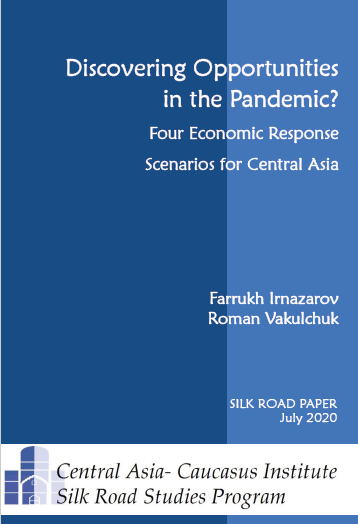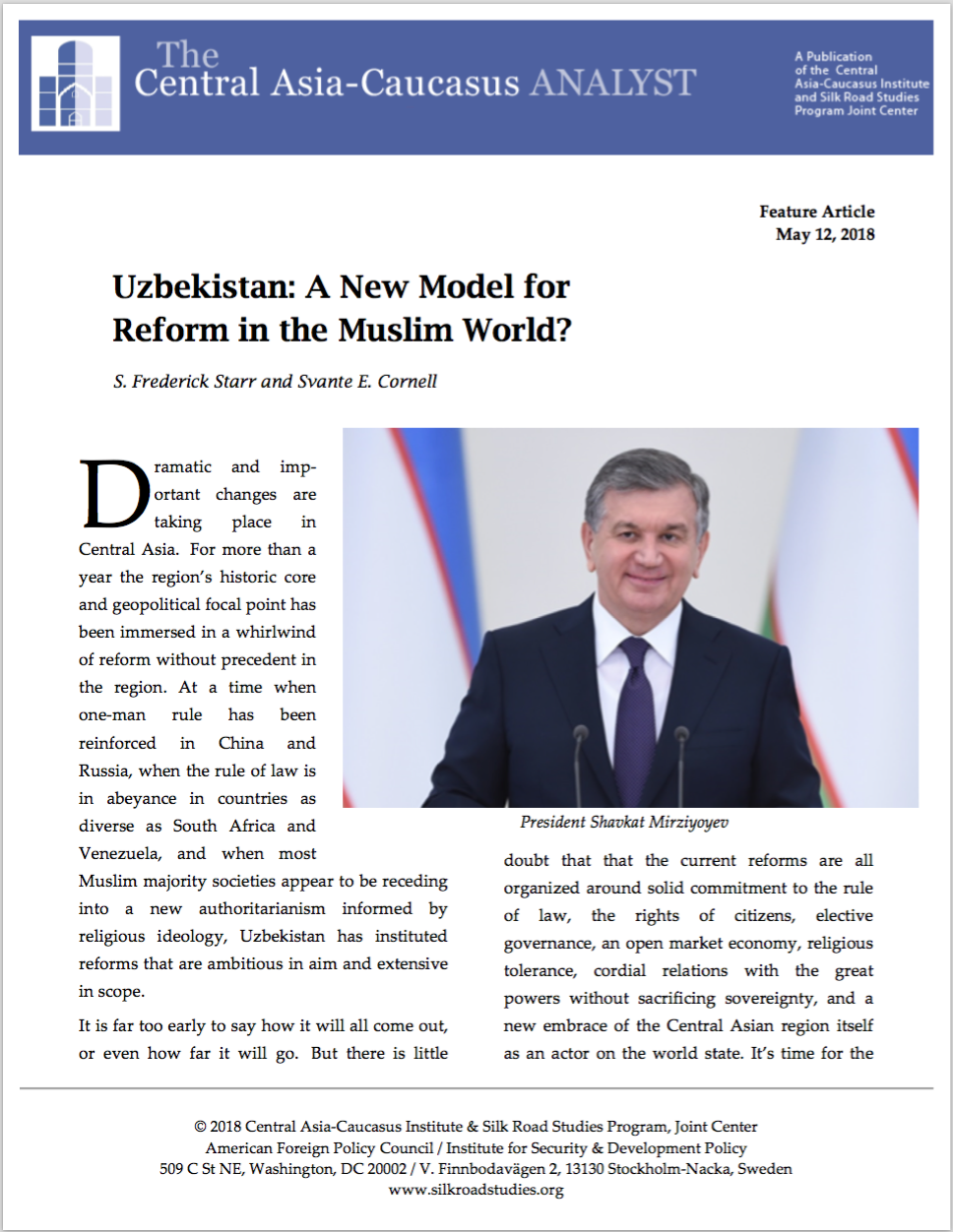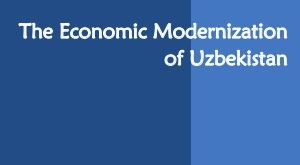Discovering Opportunities in the Pandemic? Four Economic Response Scenarios for Central Asia
Central Asia-Caucasus Institute & Silk Road Studies Program
Silk Road Paper
July 2020
The COVID-19 crisis represents not only an unprecedented economic disruption but also an opportunity for Central Asia. A specific economic policy response may trigger either game-changing reforms that can facilitate the development of full-fledged market institutions or lead to a protracted crisis that would jeopardize almost 30-year long market economy transition progress. As it is rather unclear where the recovery pendulum will make its final swing, the current situation provides fruitful soil for various assumptions. This paper proposes and examines four scenarios of economic response strategies for the region as a whole, and for Kazakhstan, Kyrgyzstan, Tajikistan and Uzbekistan in particular, that result in unique development trajectories. The paper employs the foresight methodology to build four scenarios related to the situation after the lockdown is fully lifted. The scenarios serve the purpose of helping decision makers to embark on informed decisions while shaping anti-crisis measures and better understand causality mechanisms behind their policy choices.
unprecedented economic disruption but also an opportunity for Central Asia. A specific economic policy response may trigger either game-changing reforms that can facilitate the development of full-fledged market institutions or lead to a protracted crisis that would jeopardize almost 30-year long market economy transition progress. As it is rather unclear where the recovery pendulum will make its final swing, the current situation provides fruitful soil for various assumptions. This paper proposes and examines four scenarios of economic response strategies for the region as a whole, and for Kazakhstan, Kyrgyzstan, Tajikistan and Uzbekistan in particular, that result in unique development trajectories. The paper employs the foresight methodology to build four scenarios related to the situation after the lockdown is fully lifted. The scenarios serve the purpose of helping decision makers to embark on informed decisions while shaping anti-crisis measures and better understand causality mechanisms behind their policy choices.
Scenario 1 (Protectionist Autarky): Stability upheld, limited reforms, increased role of the state and protectionism.
Scenario 2 (Impactful Diversification): Increased social support, augmented role of the private sector, comprehensive diversification and enhanced regionalization.
Scenario 3 (Inertial Asymmetry): Selective support measures, inequality-conducive, restricted diversification and limited reforms, “business-as-usual” commodity market, growing regionalization.
Scenario 4 (Unleashed Bazaar): Major institutional reforms, FDI-oriented economic openness, leapfrogging from stagnant to advanced emerging markets.
CACI Forum: Economic Outlook for the Caucasus and Central Asia with Presentations
Economic Outlook for the Caucasus and Central Asia
Growth remains broadly stable in the Caucasus and Central Asia (CCA), but it is still well below the long-term potential for the region — and too low if the region is to raise living standards to the level of other emerging economies in Europe and Asia. The challenge is to leverage good domestic policies, increased economic diversification, and stronger international cooperation to generate higher and more inclusive growth that lifts up the prospects of all CCA citizens. This task is complicated by global uncertainties, weaknesses in the banking sectors, and elevated public debt. This event coincides with the launch of the IMF's Departmental Paper: Promoting Inclusive Growth in the Caucasus and Central Asia presented by one of the authors, Mercedes Vera-Martin.
Speakers:
Juha Kähkönen, Deputy Director, Middle East and Central Asia Department, IMF
Mercedes Vera Martin, Deputy Division Chief, Middle East and Central Asia Department, IMF
Moderator: S. Frederick Starr,Chairman Central Asia-Caucasus Institute at the American Foreign Policy Council
Where: Middle East Institute: 1319 18th Street NW, 20036
When: Wednesday, June 4, 2019 from 4:00 - 5:30 pm,
The PowerPoint Presentations from both speakers are available below.
Uzbekistan: A New Model for Reform in the Muslim World
By S. Frederick Starr and Svante E. Cornell
Central Asia-Caucasus Analyst
May 12, 2018
 Dramatic and important changes are taking place in Central Asia. For more than a year the region’s historic core and geopolitical focal point has been immersed in a whirlwind of reform without precedent in the region. At a time when one-man rule has been reinforced in China and Russia, when the rule of law is in abeyance in countries as diverse as South Africa and Venezuela, and when most Muslim majority societies appear to be receding into a new authoritarianism informed by religious ideology, Uzbekistan has instituted reforms that are ambitious in aim and extensive in scope.
Dramatic and important changes are taking place in Central Asia. For more than a year the region’s historic core and geopolitical focal point has been immersed in a whirlwind of reform without precedent in the region. At a time when one-man rule has been reinforced in China and Russia, when the rule of law is in abeyance in countries as diverse as South Africa and Venezuela, and when most Muslim majority societies appear to be receding into a new authoritarianism informed by religious ideology, Uzbekistan has instituted reforms that are ambitious in aim and extensive in scope.
It is far too early to say how it will all come out, or even how far it will go. But there is little doubt that that the current reforms are all organized around solid commitment to the rule of law, the rights of citizens, elective governance, an open market economy, religious tolerance, cordial relations with the great powers without sacrificing sovereignty, and a new embrace of the Central Asian region itself as an actor on the world state. It’s time for the world to take stock of this startling development.
CACI Forum with Rumsfeld Fellows - Impact of Digital Connectivity on Governance and Economies of CAMCA Countries
CACI Forum with the Rumsfeld Fellows - Impact of Digital Connectivity on Governance and Economies of CAMCA Countries
The Central Asia-Caucasus Institute presented this spring's team of Rumsfeld Fellows, emerging leaders from the Caucasus, Afghanistan, Mongolia, and Central Asia (which the alumni themselves have dubbed the 'CAMCA Region.') At this session, they discussed how new platforms of digital connectivity between CAMCA countries can contribute to diversifying and strenthening of national economies, accelerate emerging regionalism in CAMCA and help to better integrate the region into the world economy.
Moderator:
S. Frederick Starr, Chairman, Central Asia-Caucasus Institute
For a list of the 2018 Spring Central Asia-Caucasus Fellows, a partnership between the Rumsfeld Foundation and American Foreign Policy Council's Central Asia-Caucasus Institute, click HERE.
For a link to the Rumfeld Fellows' Presentation, click HERE.
Where: The Middle East Institute, 1319 18th St. NW, Washington, DC 20036
When: Wednesday, May 2, 2018 from 4:00 pm - 6:00 pm



